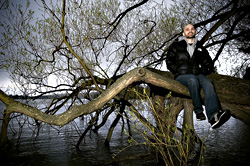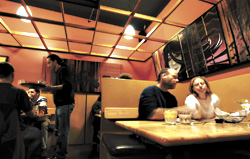“I‘ll just take every opportunity I can to look at mountains,” says David Karsten Daniels. The now Seattle-based singer-songwriter was born and raised in the flatlands of Texas. It’s the physical contrast between there and the Northwest to which he attributes, in part, his appreciation for our corner of the country. Daniels notes that taking in his new surroundings has occupied much of his time since he moved to the city. Here, he traverses the top of Phinney Ridge, where he lives, like a bird on an elephant’s spine, the Cascade and Olympic Mountain ranges rising on either side.
Seattle wasn’t always first on his list of destinations, though, he says as our feet crunch on the gravel edge of the path around Green Lake (a place he also likes to walk, in circles) during one of spring’s teasing sunbreaks. “The first time I visited Seattle, ever, it was in the winter at nighttime. It was foggy and cold, and there was this really ominous tall building rising out of downtown, and I thought, ‘This is a terrible place to live, I could never live here.’ So I went to North Carolina instead.”
But a series of circumstances—including a lady who is now his fiancee—caused him to reconsider and return. He arrived, once again just as winter was setting in, at the end of 2007—not the optimum time to move to the city, as natives and transplants will attest. It would seem especially gray and alienating to Daniels when he considered the nurturing musical friendships he left behind.
“We all spoke the same language. We hadn’t decided to do that, it just sort of happened over time.” He’s speaking of his mates back in North Carolina and the group they formed upon moving to the Raleigh-Durham area after college. Dubbing themselves the Bu Hanan Collective, the group is a congregation (Daniels is the only member no longer in North Carolina) of musical collaborators who play both individually and on each other’s projects, as well as release records on their own label. They all lived in the same house, much in the vein of creative compounds like Athens, Georgia’s Orange Twin Conservatory (home to the Elephant Six collective) or Devendra Banhart’s Topanga Canyon hideaway.
“At first it was just a way to release the music of that first band we had together, called Go Machine,” he says. “But over time it just started to feel like… we can put out more records and more music and have less kind of internal conflict with each other if, instead of trying to get everybody’s ideas into one project, everybody would just have their own project. So that’s where my solo record came in.”
Sharp Teeth, a record that Daniels calls a slower, quieter burn, is cast with Bible Belt allusions, political musings, and reflections on relationships. It was the first of his solo records to land at UK-based Fat Cat records, which has a unique policy of listening to every demo they receive. They were clearly smitten with what Daniels had self-produced and recorded with the collective in North Carolina, opting to co-release Sharp Teeth with Bu Hanan worldwide. Now they’re rallying behind his latest effort, Fear of Flying.
Fear of Flying is cut from the same lo-fi, self-recorded cloth as Sharp Teeth, much like the early work of Sam Beam or Will Oldham. Though it’s raw and far removed from the overproduced slickness of the studio, Fear of Flying contains complex arrangements. At times Wagnerian leitmotifs even seem to appear repeatedly in songs. Paradox also permeates, intentionally, themes of death and life and religion, issues that Daniels says wind up generating “a lot of questions and not too many answers. And I don’t know what to do with that other than make a record.”
The first single from the record, “Martha Anne,” came first and fast, which to Daniels is generally an indication that something’s right. A flaky-layered, addictive folk-rock jammer, “Martha Anne” packs in everything from dirty guitar solos and reedy saxophones to stair-stepping harmonies. It’s the poppiest track of the bunch, though its lyrical content (“I want to trust that everything will be alright/A choir of angels light that you can bathe in”) seems directed toward sending someone off to what lies beyond, whatever that might be.
Facing death, both abruptly and with slow acceptance, is prominent throughout the record. “Falling Down” chronicles a violent van accident on an icy mountain pass via bouncy piano and synth riffs and an ominous bass line, the music building to the climax before being flooded with elated relief when the passengers all make it through alive, clutching limbs and checking heads in disbelief. Album opener “Wheelchair,” however, sees death met with gradual deterioration, bones slowly turning to dust; it touches firmly on the thread of family while the melancholy of Mellotron flutes whines softly in the background. Likewise, religion is presented with two faces. “Heaven Isn’t Real” is a joyful choral rendering one imagines sung in a clapboard church, the whole congregation on their feet, clapping and stamping along, contradictorily decrying Heaven’s existence with their song: “Heaven isn’t real/Heaven isn’t real/It’s just a little thing to make you feel/Better/Hell is a lie/Hell is a lie/Preachers up there trying to get you to make nice.” One song later, however, the record closes with “Evensong,” a soft, meandering acoustic version of the Lord’s Prayer.
“I took care to set up a lot of contradictions so that no one could take it and say this is the statement that’s being made,” says Daniels of his work. “Because I didn’t want to make a statement. I just kind of wanted to pose questions and have people try to grapple with it. One thing I’ve found is that no matter how much you try to make yourself understood, no matter how non-abstract or straight ahead you put it, people are gonna find other things in it. So you might as well do what you want to do.”






